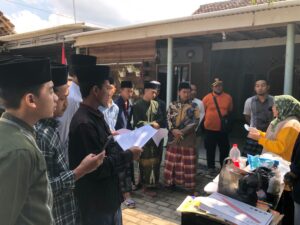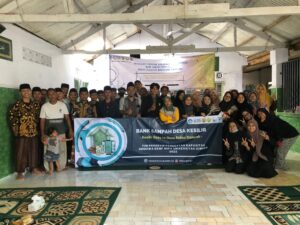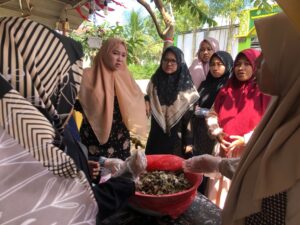 The PPK Ormawa BEMF MIPA Team at University of Jember held a second socialization with a focus on the managers and partners of the program running the waste E-Bank and Maggot production (Hermetia Illucens) as an effort to increase the economic value of waste and environmental health in Kesilir Village. This program involves the community of RW 14 around the Pondok Pesantren DaarusSalaam Yasinat who will become customers of the Waste E-Bank program.
The PPK Ormawa BEMF MIPA Team at University of Jember held a second socialization with a focus on the managers and partners of the program running the waste E-Bank and Maggot production (Hermetia Illucens) as an effort to increase the economic value of waste and environmental health in Kesilir Village. This program involves the community of RW 14 around the Pondok Pesantren DaarusSalaam Yasinat who will become customers of the Waste E-Bank program.
The socialization aims to provide information on waste sorting, maggot cultivation, and the process of making compost. The activity is divided into two posts, the first post learns to sort inorganic waste according to its type and the second post learns about maggot cultivation and making compost. Training with hands-on practice using inorganic waste and maggot media. Inorganic waste is sorted and collected according to its type.
Inorganic waste is used as maggot feed, if the maggot is still in the form of eggs or small maggots then the inorganic waste must be ground first. For adult maggots, they can be given organic waste food that has been mashed or not. Pureed organic waste will not produce typical sewers, while organic waste that is not mashed will produce typical sewers that can be processed into compost. Compost fertilizer is made by mixing soil and typical sewers that are given eco enzymes and allowed to stand for 3 months then filtered. The filter results produce compost.
This socialization was carried out to provide education to the Pondok Pesantren DaarusSalaam Yasinat and local residents to implement a healthier lifestyle by caring for the waste in the surrounding environment. Waste that they consider has no value, if it can be managed properly it can increase the income of local residents. With this program, it is hoped that all Kesilir residents, especially the Yasinat Islamic Boarding School, can utilize organic and inorganic waste properly and have value..


